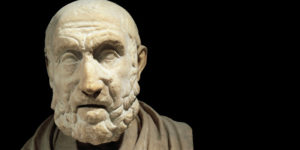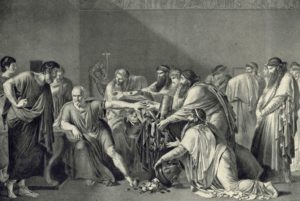Hippocrates of Kos was a Greek physician of the Age of Pericles, and is considered one of the most outstanding figures in the history of medicine. He’s often referred to as the “Father of Medicine” in recognition of his lasting contributions to the field as the founder of the Hippocratic School of Medicine. Take a look below for 30 more fun and interesting facts about Hippocrates.
1. His school revolutionized medicine in ancient Greece, establishing it as a discipline distinct from other fields with which it had traditionally been associated, therefore, establishing medicine as a profession.
2. The achievements of the writers of the Corpus, the practitioners of Hippocratic medicine and the actions of Hippocrates himself were often mixed, so very little is known about what Hippocrates actually thought, wrote or did.
3. Hippocrates is commonly portrayed as the paragon of the ancient physician, and credited with coining the Hippocratic Oath, which is still relevant and in use today.
4. He’s credited with greatly advancing the systematic study of clinical medicine, summing up the medical knowledge of previous schools, and prescribing practices for physicians through the Hippocratic Corpus and other works.
5. He believed that diseases were caused by some type of natural action instead of being caused by the spirits or gods.

6. Hippocrates was the son of Praxithea and Heracleides.
7. His family’s wealth allowed him to receive a very good education when he was a child.
8. After studying nine years of reading, spelling, writing, physical education, poetry, singing, and music, he attended two years of secondary school.
9. Hippocrates likely studied medicine under his father. He observed not only his father, but also another physician, Herodicos, on how they treated patients.
10. His training may have included trips to the Greek mainland and quite possibly to Libya and Egypt, to learn other medical practices.
11. Hippocrates was given credit for healing many people, such as Macedonia’s king, whom he had treated for tuberculosis.
12. His dedication to healing was tested when he fought the plague in Athens for three years from 420 to 427 BC.

13. The peak of his career occurred during the time of the Peloponnesian War.
14. Hippocrates taught medicine to his own sons, Draco and Thessalus.
15. One of the main things that Hippocrates taught the students at his school was that it was important to keep a record of the patient’s condition and symptoms.
16. The Hippocratic Corpus is a collection of 70 medical books that are considered to be the oldest known books about medicine. Each subject matter was written for a particular reader or student. Some books were written for physicians and some for pharmacists, while others were written for the layman.
17. Hippocrates recommended diet and physical exercise as remedies or cures for ailments. However, he pointed out that some individuals who couldn’t or wouldn’t follow these recommendations would most likely need some type of medicine.
18. His work taught that physical handling may cure physical troubles, such as a dislocated shoulder, where the physician could position it back into place.
19. The Hippocratic Oath is a document on medical practice ethics and morals. It was credited to Hippocrates, although new information shows that it could have been written after he died.
20. The Hippocratic Oath is believe by many to be the most famous document of the Hippocratic Corpus.

21. Even though the Hippocratic Oath today isn’t often applied in its original form, it’s still the foundation for many other oaths or laws that outline what the good practice and morals of medicine should be.
22. The Hippocratic work On the Physician recommends that physicians always be well-kept, honest, calm, understanding and serious.
23. The Hippocratic physician paid careful attention to all aspects of his practice: he followed detailed specifications for, “lighting, personnel, instruments, positioning of the patient, and techniques of bandaging and splinting,” in the ancient operating room.
24. The Hippocratic School highlighted the importance of the clinical doctrines of observation and documentation.
25. Hippocrates and his followers were the first to describe many diseases and medical conditions.
26. He’s given credit for the first description of clubbing of the fingers, an important diagnostic sign in chronic lung disease, lung cancer and cyanotic heart disease.

27. Hippocrates was the first physician to describe Hippocratic face in Prognosis.
28. Hippocrates began to categorize illnesses as acute, chronic, endemic and epidemic, and use terms such as, “exacerbation, relapse, resolution, crisis, paroxysm, peak and convalescence.”
29. He was the first documented chest surgeon and his findings and techniques, while crude, such as the use of lead pipes to drain chest wall abscess, are still valid.
30. Hippocrates was first portrayed as a king, dignified, old country doctor and later on as stern and forbidding.




